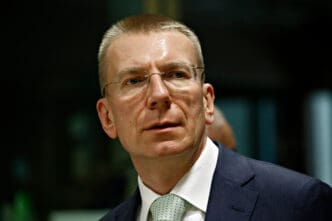Executive Summary
The Story So Far
Why This Matters
Who Thinks What?
Latvian President Edgars Rinkēvičs has urged Hungary and Slovakia to heed President Donald Trump’s call for European nations to cease importing Russian gas and oil. Rinkēvičs stated that ending reliance on Russian energy is a matter of “political will,” linking an accelerated phase-out to impacting Russia’s war in Ukraine.
Rinkēvičs cited Latvia’s own journey from 100% dependency on Russian energy in 2017 to complete independence in 2025, diversifying its suppliers. He emphasized that this transition demonstrates that political will leads to tangible results.
The European Union has significantly reduced its reliance on Russian oil and gas since February 2022, cutting crude oil imports from approximately 27% to 3% and natural gas from roughly 45% to 18-19%. However, Slovakia and Hungary continue to firmly oppose a complete phase-out.
During his address at the UN General Assembly, President Donald Trump previously criticized the European Union for continuing to purchase Russian energy. He questioned the logic, stating, “They’re funding the war against themselves.”
Rinkēvičs believes that accelerating the phase-out of Russian oil and gas could significantly influence the ongoing conflict in Ukraine. He argued that increased sanctions and reduced energy purchases would further strain Russia’s economy.
Sanctions and Frozen Assets
The Latvian President also called for a decision on how to utilize €210 billion in frozen Russian assets to support Ukraine, particularly for weapons. The EU is currently exploring options for these funds to aid Ukraine’s defense and post-war reconstruction.
Furthermore, Rinkēvičs urged the EU to impose “secondary sanctions against countries that are helping Russia circumvent” existing measures. He noted that some third countries are enabling the evasion of EU sanctions against Russia.
Ukraine’s Security Guarantees
Regarding Ukraine’s long-term security, Rinkēvičs indicated that the EU is “still not at the stage of making final decisions about providing real security guarantees.” A “coalition of the willing,” led by France and the UK, is working to develop a common approach for post-war security, potentially including troop deployment.
He stressed the necessity of US support if the EU decides to provide security guarantees or send troops on the ground. This support, he clarified, would involve logistical assistance, intelligence, and other forms, rather than necessarily US troops on the ground.
Rinkēvičs also commented on the political process, stating that much depends on the evolution of relations between Russia and Ukraine. He expressed skepticism, saying he doesn’t “see any willingness on the part of Russian Federation to enter into the serious peace talks.”
Outlook on EU Energy and Security
President Rinkēvičs’s remarks underscore a dual focus within the EU: accelerating energy independence from Russia through political will and strengthening support for Ukraine through financial measures and security guarantees. These efforts aim to exert economic pressure on Russia while securing Ukraine’s future, though challenges remain in achieving consensus and ensuring necessary international backing.








